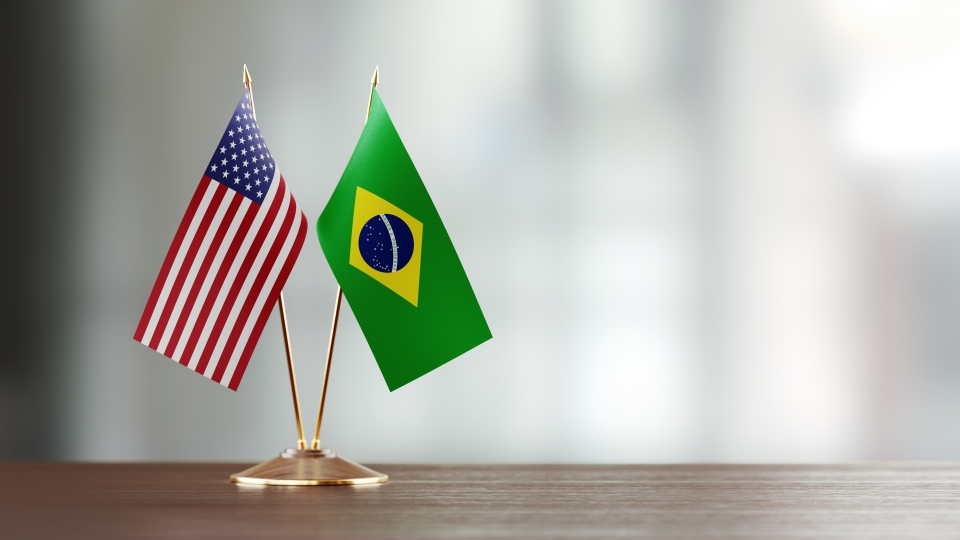Sanctions Mark New Era of US-Brazil Relations
August 12, 2025
- Author
- Jay Pfeifer

The United States recently hiked tariffs on a number of Brazilian goods by 50 percent and added Treasury sanctions against a Brazilian supreme court justice whose U.S. visa already was revoked in early July.
The moves mark a major departure for American policy towards Brazil, says Britta Crandall, director of the Center for Interdisciplinary Studies and Associate Professor of the Practice in Political Science at Davidson College
“Some would say U.S. policy has been benign neglect,” she said. The countries have generally co-existed peacefully. Their relationship hasn’t required careful attention. That might be because they are reflections of one another.
“You'd be hard pressed to find a country that's more similar to the U.S. than Brazil. Both are large continental nations, our histories are shaped by colonization and a massive slave trade, and our governments both incorporate a diverse federal system.”
Their contemporary politics are also mirror images. Former president Jair Bolsonaro, who earned the nickname “Tropical Trump” for his policies and brash style, is currently facing charges for plotting a coup after protestors stormed the Brazilian capital building in January 2023.
Crandall shared her thoughts on the growing tensions.
Can the new U.S. tariffs on Brazilian goods be seen as an attempt to assert economic dominance?
Yes, but Brazil’s case is unique. In almost all of Trump’s tariff threats, tariffs are deployed to offset trade deficits. However, Brazil is one of a very few countries with which the United States runs a trade surplus. At first glance, it might appear that the tariffs are aimed at undermining President Luiz Inácio Lula da Silva or “Lula,” whose political stance contrasts sharply with Trump’s. But this interpretation doesn’t tell the whole story.
Trump previously imposed tariffs on Brazilian steel in 2019, during the presidency of Bolsonaro, a close political ally. So we know that these new tariffs aren’t simply ideological. Rather, Trump just really likes tariffs, and is also wielding economic instruments for broader geopolitical purposes.
Where does Bolsanaro fit in the latest sanctions?
There is a close political connection between Bolsonaro and Trump. Bolsonaro has deliberately mirrored Trump and cultivated close ties. His son Eduardo has lived in the United States since February, and his advisors very much have the ear of the Trump administration.
How unusual are the sanctions targeting Brazilian Supreme Court Justice Moraes who is overseeing the case against Bolsanaro?
It's unusual for someone who isn't seen as somehow operating outside of the law. We've seen this type of sanctions used against Venezuelan criminals who are money laundering, Russian oligarchs, or Haitian gang leaders. But these sanctions are built on a wider definition of what constitutes illicit activity.
How have the tariffs and sanctions affected domestic Brazilian politics?
There have been some signs that Trump’s actions against Justice Moraes have galvanized Bolsonaro’s base. At the same time, one could argue that these tariffs are the greatest thing that the United States could have done for Lula. Lula can now blame any economic challenges on Trump and the United States, similar to say, Castro and the U.S. embargo against Cuba. So the short-term domestic impact in Brazil of Trump’s actions has been an exacerbation of political polarization.
Ultimately, If there's one message that has resonated over the decades in Brazil, it's a desire for autonomy, for national sovereignty and a deep distaste for meddling. So, this has the potential to help Lula more than it helps Bolsonaro. Also, in a bit of irony, the tariffs target the Brazilian agricultural industry most—coffee, cattle ranching, orange growers—precisely the industries that form the backbone of his support base. This has put Bolsonaro in a tricky spot, and we’ve already seen some of his staunch supporters and family members voice pushback.



